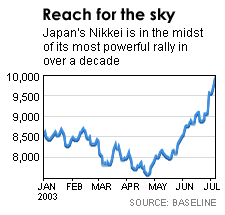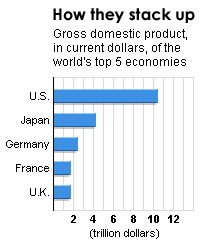NEW YORK (CNN/Money) - After seeing it give off enough head fakes to put Barry Sanders to shame, investors have wisely come to view the Japanese stock market cautiously.
Yet there is no denying that the rally Tokyo shares have seen recently is intense. Since hitting a 20-year low on April 28, the Nikkei index has jumped 31.3 percent.
Now Japan has had its share of serious bear market rallies since its market began to fall in 1990, but in only one of them -- a 32 percent affair back in 1992 -- did the Nikkei rise so quickly. One has to seriously consider whether Japan's economy threatens to actually dig itself out from the mire -- an event that would major implications for investors and policy-makers around the world.

It's not just the Nikkei that's been sending optimistic signals on the economy lately. Japanese government bonds have seen a stunning drop in just a little less than a month. This has driven the yield on the benchmark 10-year bond to 1.09 percent from the June 11 level of 0.43 percent. The big reversal in the U.S. Treasury market seems puny by comparison.
"Given the moves in the markets, you have to wonder whether Japan is going to surprise on the upside on growth," said Trilogy Investment Advisors chief investment strategist Bill Sterling.
That's a notion that's been underscored by some recent reports on the economy. In last week's Tankan report -- a quarterly survey of business confidence that is viewed by Tokyo markets as Japan's premier economic report -- large manufacturers showed the least amount of pessimism in two years. Then, Tuesday, the government reported that machinery orders increased by 6.5 percent in May against economists' expectations for a drop. The rise in orders suggests that Japanese companies are girding themselves for an improving economy.
Still a power in the world
Even after more than a decade of stagnation, Japan's $4.2 trillion economy (in current dollars) easily ranks as the world's second-largest behind the United States, which weighs in at $10.4 trillion (also unadjusted for inflation). Germany, the third largest, comes in at just $2.4 trillion.
If Japan's gross domestic product were to grow at, say, 3 percent for a few years rather than the 0.8 percent it's averaged over the past five years (worse if you don't adjust for deflation) the dynamics of the global economy would change significantly. The resulting increase in demand out of Japan would give the world's, and particularly Asia's, manufacturers another outlet for their goods and let them run closer to their full capacity.

"That would be a positive," said Carlos Asilis, a portfolio manager with the hedge fund Vega Asset Management. "Some of the world's excess capacity would be ameliorated."
But Asilis also points out that an improved economy in Japan would pose challenges for the United States. It would provoke a continued back-up not just in Japanese government bond yields, but also U.S. yields, as the Japanese investors who have put their money in Treasurys would take it back home, looking for higher returns. Such a rate rise could curtail U.S. housing activity and also make it more difficult for public companies to fund themselves through debt issuance.
Further, Asilis notes, while a rebound in Japan could help sop up some of the world's overcapacity, many of the excesses in the United States are localized. A Japanese revival will do nothing, for instance, to alter the fact that there are far too many U.S. telecom companies chasing after far too few customers.
Even monkeys fall from trees
Many Japan watchers believe that there's not much need for investors to start reckoning what a Japanese economic revival would mean -- it just isn't in the cards.
"The dynamic of the move in stocks is you have an extremely bombed-out market coupled with a central bank that has taken a slightly more adventurous approach to monetary policy," said Russell Jones, chief international economist at Lehman Brothers, who until 2000 was his firm's Japan economist. "But in overall macro terms, the place is still a complete and utter economic disaster."
In fact, some observers believe that the big shift in the Japanese markets has more to do with some savvy traders knowing a good trade when they see one than anything else. On June 11, when the Japanese 10-year bond hit its all-time low yield of 0.43 percent, the dividend yield on the Nikkei was 1.12 percent. That meant that you could go short the bonds, go long the stock market, and as long as the Nikkei was at or near its current level in 10 years' time when the bond matured, you would make money.
"Many people were jumping on that trade," said Julius Baer head of international equities Rudoph-Riad Younes.
With the bond yielding 1.09 percent and the Nikkei yielding 1.01 percent, the trade isn't as attractive. But enough of a head of steam has built up in the stock market that many of the international fund managers who are underweight Japan in their portfolios may have to adjust their positions. That would send the Nikkei higher still. A rally in stocks doesn't mean that economic recovery is around the corner.
"People confuse cause with effect sometimes," said Younes. "Just because somebody opens an umbrella doesn't mean it's going to rain."

|

